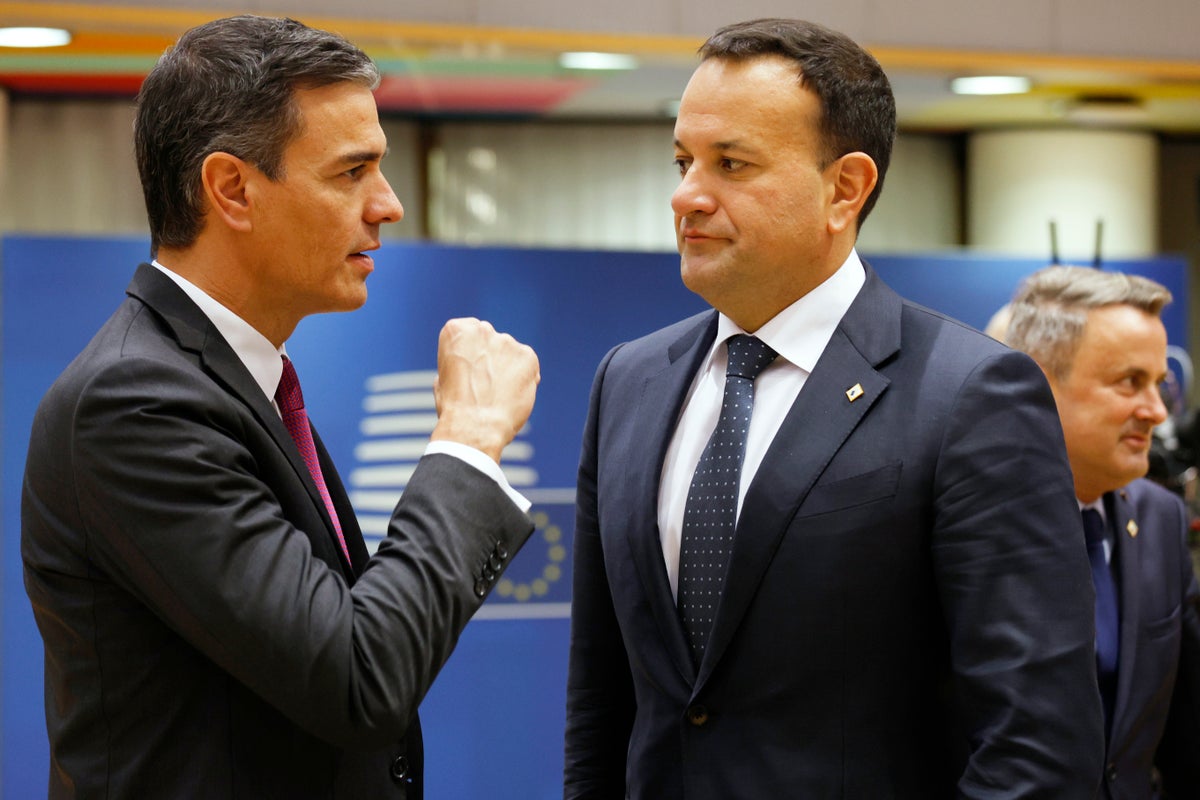
As distant as the prospect of peace might seem, European Union leaders believe it is time to start laying the foundations for a future relationship between Israel and the Palestinians where the militant group Hamas does not control Gaza.
Mindful that resentment and even conflict in the wider Middle East and Gulf regions have been fueled by decades of tensions between Israel and the Palestinians, the 27-nation bloc has begun exploring ways to realize a long-held EU ideal — two states living peacefully side by side.
As the Palestinian death toll climbed beyond 7,000 and Israel carried out airstrikes on Friday in response to the bloody Hamas incursion into southern Israel, EU leaders meeting in Brussels for a second day encouraged broader diplomatic and security initiatives to stop the conflict from spreading, and ultimately from ever starting again.
“The history of this conflict didn’t begin with the attacks on Oct. 7 and won’t end with a land war in Gaza,” Irish Prime Minister Leo Varadkar said. “It’s very, very clear: 75 years of conflict between Israel and the Arabs, wars, terrorist attacks, huge instability. This won’t end because of a military solution. It can’t.”
Belgian Prime Minister Alexander De Croo said that “a pure security policy and a pure security solution is part of the reason (this conflict) has happened. So at some point a political dialogue needs to start.”
Apart from its aid and trade leverage, the 27-nation bloc has no obvious security role to play in the conflict. It backs Israel’s right to defend itself against Hamas, which killed more than 1,400 people in Israel. Hamas is holding at least 229 captives inside Gaza, including dozens of EU citizens.
But as civilian casualties in Gaza mount, it also wants Israel to respect international law. Hamas is on the EU’s list of terror organizations and receives no funding from the bloc. Indeed, a review of its substantial assistance to the Palestinians is underway to ensure that none leaks to the group.
The EU member nations have long been divided in their positions on the region — Austria, Germany and Hungary staunch backers of Israel, Spain and Ireland more vocal in their support for the Palestinians — but the bloc does have credibility as a European project founded on peace.
“All 27 countries agreed to this,” Varadkar told reporters. “That there should be a two-state solution, and that we need to have a peace conference, and that the European Union needs to be part of that.”
The EU has for years tried to promote the idea of an Israeli and a Palestinian state with borders set mostly as they were in 1967 — before Israel captured and occupied the West Bank and Gaza — with some land swaps agreed between them. Both would have Jerusalem as their shared capital.
In a statement agreed overnight, the leaders said they are “ready to contribute to reviving a political process on the basis of the two-state solution.” They also said the EU “welcomes diplomatic peace and security initiatives and supports the holding of an international peace conference soon.”
Spanish Prime Minister Pedro Sanchez said that the peace conference must be held within six months.
It will mean working more closely with Israel’s neighbors, Egypt, Jordan and Lebanon, as well as with Gulf countries like Qatar, which has the kind of relations with Hamas that could help get hostages released. Iran’s demands would have to be managed. Saudi Arabia and Turkey could play key roles.
Top EU officials concede that their international peace efforts so far have not been effective. This is the fifth war between Israel and Hamas, and the number of deaths in the past three weeks exceeds the combined tally of those killed in the previous four, which is estimated to be around 4,000.
“If we don’t stop this cycle of violence, it will happen again in the future. The level of trust between Israeli and Palestinian, which was already extremely low in recent years, is now at the level of the Dead Sea,” EU foreign policy chief Josep Borrell wrote in a blog this week.
“Peace will not come by itself; it has to be built,” added Borrell, who leads international diplomatic efforts on behalf of the EU. “The two-state solution remains the only viable one we know. And if we only have one solution, we must put all our political energy into achieving it.”







